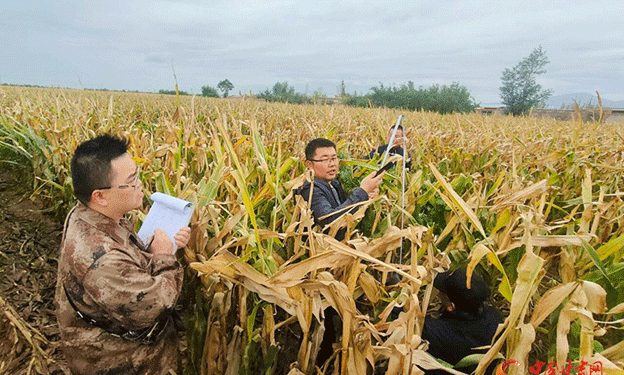In Linze County, Gansu Province, agricultural experts have taken significant strides in advancing corn hybrid seed production through mechanized processes. As part of a demonstration project in Shahe Town, a team of provincial and city-level agronomy specialists recently conducted field yield tests on a new corn hybrid variety, focusing on its mechanized detasseling efficiency. These tests aim to improve both yield accuracy and overall production efficiency, providing valuable data to further develop fully mechanized corn production.
Field Harvest Testing: A Crucial Tool for Progress
Corn is one of China’s most important staple crops, and hybrid seed production plays a critical role in ensuring high yields and resilience to environmental stresses. In order to accurately assess production efficiency, experts from the Linze Agricultural Technology Department set up a testing site at Lanpu Village, where they measured yields for corn plots that employed both mechanical and manual detasseling methods.
After carefully harvesting and weighing the corn from these fields, data revealed that mechanized detasseling offers significant cost-saving benefits. On average, mechanized planting and detasseling reduced costs by 150 to 200 yuan per mu (about 0.067 hectares) compared to traditional manual methods. Beyond cost savings, mechanized detasseling improves labor efficiency and reduces the margin for error during critical phases of production, such as pollination.
Improved Yields and Drought Resistance
In addition to cost savings, field testing provided insights into the performance of the new corn hybrid variety under mechanized conditions. Agricultural expert Xiao Yi emphasized that these tests help farmers better understand the drought resistance and stress tolerance characteristics of the corn variety, which is increasingly important as climate variability affects regional agriculture. By identifying high-yield, resilient varieties, farmers can more effectively adapt to environmental challenges.
The hybrid seed corn showed robust performance in terms of yield and quality, reinforcing the importance of adopting superior varieties and advanced mechanized farming techniques. The combination of high-quality seeds and modern technology has the potential to significantly increase production output while minimizing resource use, a crucial factor as farmers face rising costs and tighter margins.
A Step Towards Full Mechanization
Linze County has long been recognized as a key base for corn seed production, and the local government continues to prioritize the advancement of mechanization in agriculture. Shahe Town has embraced mechanized corn production as a core strategy for increasing both scale and efficiency. The implementation of mechanized detasseling, as part of a broader effort to achieve full-process mechanization in hybrid seed corn production, addresses key bottlenecks in the production chain.
Wang Yongwen, director of the Shahe Town Agricultural and Rural Services Center, explained that mechanization not only improves the standardization of planting but also reduces production losses, particularly in the seed corn industry. This comprehensive approach—from planting and pest control to harvesting—significantly enhances efficiency, reduces the risk of crop loss, and boosts profitability for farmers. The integration of information technologies further optimizes planting schedules, water usage, and other key factors affecting yields.
The field tests conducted in Linze’s Shahe Town showcase the potential of mechanized corn hybrid seed production to revolutionize local agriculture. By reducing costs, improving yields, and promoting the use of resilient hybrid varieties, mechanization supports sustainable growth in corn production. As more farmers adopt these techniques, the region is poised to achieve higher levels of efficiency and profitability, ensuring long-term agricultural success.
Error




